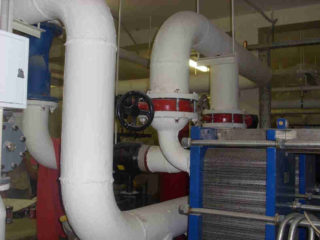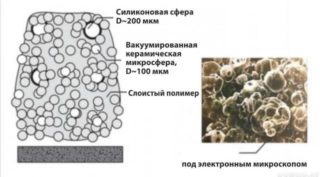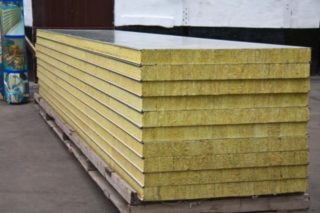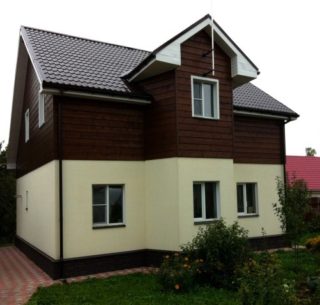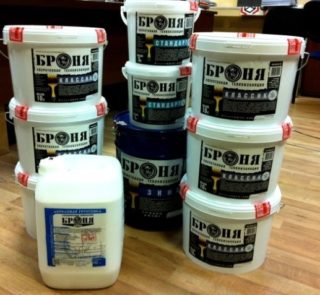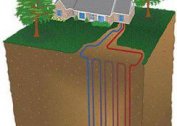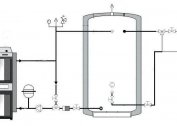One of the important measures to improve the energy efficiency of the house is the insulation of the building's facade. Until recently, such a procedure was very laborious, requiring many technical measures. Now the task has been simplified in connection with the appearance of innovative heaters on the market. Thermal insulation Armor is several times superior in parameters to mineral wool and polystyrene, but at the same time its application to the surface can be done with minimal effort, time and improvised means.
What is thermal insulation Armor
Coating "ultra-thin thermal insulation" is a substance in appearance, method of application and structure similar to paint. The composition of this mastic contains the following components:
- basic acrylic bond, in a fractional ratio - 5 part of the total mass;
- polymer fixatives;
- catalytic substances;
- the microsphere filler, in a proportion of 4 parts of the total mass, has a ceramic origin with micro-thin walls and rarefied air inside (up to 80% rarefaction).
As auxiliary components, antiseptic and anticorrosive additives are present in the structure.
Heat-insulating paint Armor is often produced in the form of a white suspension, which, after hardening on the surface, creates a dense film with a matte finish. The material is elastic to the touch, in terms of the quality of interaction with the environment, it is resistant to all types of exposure. The thermal insulation effect is due to the inability of the limited in the sphere of discharged air to conduct thermal energy (the principle of vacuum space).
Initially, ceramic-type thermal insulation was planned to be used for the purposes of the space industry.
Varieties of liquid heaters
The manufacturer offers several product modifications. Each type of composite has a basic base and certain additives depending on the purpose of the paint. The options for insulating facades differ from each other in climatic design, where composites designed for more cycles of exposure to negative temperatures have been developed for more severe regions. Specialized mixtures are more focused on protection from moisture, fungal elements and fire.
Base coatings
Under the base, these brands of mastics are produced:
- Classic NG, Classic;
- Facade NG, Facade;
- Antikor;
- Winter NG, Winter.
These are standard modifications of the heat insulator for operation at positive and negative temperatures.
Budget coverage
Brands of budget composites are presented in the following options:
- Universal NG, Universal;
- Wall NG, Wall;
- Metal;
- Nord NG, Nord.
A series of analogues of base brands has lower performance and a smaller price niche.
Specialized Thermal Insulators
Modifications of specialized mixtures:
- Standard NG, Standard;
- Light NG, Light;
- Fire protection Nord, Fire protection;
- Volcano.
Thermal insulation coatings have additional properties.
Characteristics of paint for insulation Armor
The developer endowed the product with the following properties:
- the mass has a uniform structure of a white shade;
- the composite has a density of 0.558 g / cm3 cubic;
- the structure contains non-volatile substances in a mass ratio of 44%;
- vapor permeability for grades of facade mastics - 0.013 Mg / mh Pa;
- heat transfer coefficient - 1,380 W / m, degrees Celsius;
- coefficient of thermal conductivity - 0.0012 W / m, degrees Celsius;
- film resistance to water and alkali during the day - the film retains its appearance;
- exposure to negative temperatures over 50 cycles - the film retains its properties;
- adhesion to concrete - 1.33 MPa, with steel - 2.20 MPa, with brick - 2.04 MPa;
- resistance to high temperatures up to 200 degrees Celsius - the film retains its integrity and properties.
The substance in question is not a combustible material and flame propagation medium.
Positive and negative qualities of mastic
Positive properties that insulation Bronya possesses:
- A thin layer of mastic in one millimeter is able to replace mineral wool with a thickness of 5 cm.
- The product is universal - it is a heat insulator, a means of corrosion and a kind of antiseptic.
- The paint is easy to apply with a conventional roller, brush or with a fine dispersion spraying machine.
- A wide range of operating temperatures allows the use of the material in any climatic zones.
- The mass of the thermal insulator is negligible and does not exert a load on the supporting structure.
- Mastic has excellent adhesion to any type of surface (with the exception of oily and greasy surfaces).
- The paint does not absorb moisture, is stable with respect to ultraviolet radiation.
- The coating is flexible, withstands light loads and has good maintainability.
In the example of the negative qualities of the insulation, you can specify its high cost, reaching up to 1000 rubles per liter of paint, a drying period of at least 24 hours and the inability to work with a thermal insulator at an ambient temperature below +7.
Scope of suspension
Brands of liquid insulation Bronya effectively insulate the following structural elements of the house:
- external walls of any configuration before finishing work;
- simple and complex roofs both on the outside and from the attic;
- walls of loggias and balconies from the inside;
- concrete floor surface.
The coating proved to be good at creating thermal insulation on boiler equipment, cold and hot water supply lines, centralized steam pipelines and heating mains, in air conditioning systems on air ducts, when warming public and private vehicles, refrigerators, trailers, various tanks and containers, as well as sea transport. Often, the method of applying paint to cold water pipelines eliminates the condensation deposited on them.
Product range
Details of product brands presented by Bronya:
- Composite Classic - composition of a universal property for insulation. Packing happens on 20, 10 and 5 liters.
- Mixture Standard is an analogue of the insulation of the classic version at a lower price. Effectively works as a heat barrier for capacities and communications.
- Antikor - protective mastic to prevent the appearance and development of rust with the effect of thermal insulation.
- Thermal mixture Winter - a composite for work at low subzero temperatures. She can work at -35 degrees Celsius.
- Modification Facade - for insulation of external walls with the possibility of penetration of steam.
- Light - a finishing material with the parameters of a heat insulator.
- Fire retardant composition - increases the resistance of structures to direct exposure to fire.
- Wagon - an analogue of the classic and standard brand, designed for the budget consumer.
- Metal - in its properties, it is similar to anticorrosive, but in a more affordable price category.
- Modification Wall - a vapor-permeable mixture, released as a cheap alternative to the Facade.
- Brand Nord - an analogue of mastic Winter.
- Anti-condensation is a specialized paint to prevent the release of moisture on materials.
All brands with the prefix NG are non-combustible.
